borrowings borrowings Christian lexicosemantical Armenian Armenian
Grazer Linguistische Studien 50 (Herbst 1998 ... - [romani] Projekt
Grazer Linguistische Studien 50 (Herbst 1998 ... - [romani] Projekt
- No tags were found...
You also want an ePaper? Increase the reach of your titles
YUMPU automatically turns print PDFs into web optimized ePapers that Google loves.
Grazer Linguistische Studien 50 (Herbst 1998) 103<br />
Hristo Kyuchukov<br />
TURKISH AND ARMENIAN LOANWORDS IN BULGARIAN ROMANI<br />
1. INTRODUCTION<br />
The languages in a contact are characterized with phenomena as code-switching and <strong>borrowings</strong><br />
from language A to language B. <strong>Armenian</strong> and Turkish are two languages which<br />
came in a contact with Romani during the mid centuries, when the Roma people were in<br />
their way from India to Europe. According to Crystal (1992) vocabulary <strong>borrowings</strong> are<br />
usually called loanwords. Sankoff/Poplack/Vanniarajan (1991) estimate that the loanwords<br />
are impossible to distinguish from the native lexicon into which they are borrowed on the<br />
basis of phonology, morphology and syntax. The general principle is that content words are<br />
borrowed while function words are resistant to loan. There are studies which show <strong>borrowings</strong><br />
and loanwords in Romani from <strong>Armenian</strong> (Boretzky/Igla 1994; Boretzky 1995).<br />
However, up till now there is no any lexico-semantical classification made of the existing<br />
<strong>Armenian</strong> and Turkish loanwords in Romani.<br />
My observations here are on a dialect which exists in Bulgaria and it belongs to the<br />
group of Vlah dialects and it contains <strong>Armenian</strong> and Turkish loanwords. In some parts of<br />
Bulgaria this dialect is spoken by Muslim Roma and they are called Laho (Vlah Roma) (in<br />
North-East Bulgaria). In some other parts of Bulgaria the speakers of this dialect are <strong>Christian</strong><br />
Roma (for example in Southern parts of Bulgaria around the town of Stara Zagora)<br />
and they are called Dasikane Roma (<strong>Christian</strong> Roma). Kyuchukov (1994) reporting about<br />
the language mixing of Romani with Turkish among the Muslim Roma in Bulgaria also<br />
mentions this dialect calling it Laho dialect as the speakers of it call themselves.<br />
2. AIM OF THE STUDY<br />
My goal here is to classify the existing <strong>Armenian</strong> and Turkish loanwords into <strong>lexicosemantical</strong><br />
groups and to show two different types of loanwords: a) the first one from <strong>Armenian</strong><br />
(old forms of <strong>borrowings</strong>) and b) the new one from Turkish (new forms of <strong>borrowings</strong>).<br />
3. INFORMANTS AND DATA COLLECTION<br />
The data for this study was collected in Bulgaria among the speakers of Vlah dialect. This<br />
dialect is much more conservative than the existing non-Vlah dialects. The speakers have<br />
Muslim or <strong>Christian</strong> religion, however the both groups have the same loanwords from <strong>Armenian</strong><br />
and Turkish. They live in different circumstances and have different second lan-
104 H.Kyuchukov<br />
guages (L2) – the Muslims have Turkish as L2 and the <strong>Christian</strong>s have Bulgarian as L2. In<br />
their vocabulary one can find the same loanwords from both <strong>Armenian</strong> and Turkish (for<br />
example the word paramisi for 'fairy tale' in both groups is unknown and they use the word<br />
masali from Turkish masal 'fairy tale').<br />
The data was collected in the usual setting of the speakers – at home, speaking naturally,<br />
and they were asked to tell autobiographical story and a fairy tale in Romani. The conversations<br />
were recorded and transcribed. The informants are between 30 and 70 years old<br />
male and female and all together their total number is 5 – two male and three female (2<br />
female Muslim speakers from North- East Bulgaria and 2 male and 1 female <strong>Christian</strong> speakers<br />
from South Bulgaria).<br />
4. LEXICO-SEMANTICAL GROUP OF NOUNS<br />
4.1. Loanwords from <strong>Armenian</strong><br />
The <strong>Armenian</strong> loanwords in Romani are were adapted with very slight changes, usually as<br />
they exist in <strong>Armenian</strong>. It is known that Romani came in contact with <strong>Armenian</strong> before<br />
arriving to Greece and it is obvious that there are no Greek elements in this first type of<br />
loanwords. Here I will try to classify them in different lexico-semantical groups.<br />
4.1.1. Parts of human body<br />
þekat from Arm. þikar<br />
morþi from Arm. morth<br />
koþ from Arm koþ<br />
ogi from Arm ogi, hogi<br />
'forehead'<br />
'skin'<br />
'knee'<br />
'soul'<br />
4.1.2. Names of vegetables and fruits<br />
dudum from Arm. dudum<br />
'pumpkin'<br />
4.1.3. Names of foods<br />
bokoli from Arm. bokel<br />
xumer from Arm. x mor<br />
'small flat loaf'<br />
'dough'<br />
4.1.4. Names of animals<br />
grast from Arm. grast<br />
khuro from Arm. khurak<br />
rikono from Arm. koriwn<br />
'horse'<br />
'young horse'<br />
'puppy'
Turkish and <strong>Armenian</strong> Loanwords in Bulgarian Romani 105<br />
4.2. Loanwords from Turkish<br />
The loanwords from Turkish are much latter incorporated and they are formed differently.<br />
Usually the Turkish words are used without any phonological or morphological changes,<br />
but with Romani suffixes for masculine and feminine gender: -i, -es, -os. The loanwords<br />
with Turkish origin can be divided into the following groups.<br />
4.2.1. Names of plants, flowers, fruits and vegetables<br />
arpadzikos from Tur. arpacik<br />
asmas from Tur. asma<br />
bademi from Tur. badem<br />
baklas from Tur. bakla<br />
gjuli from Tur. gül<br />
zarzavati from Tur. zarzavat<br />
zjumbjul from Tur. zümbül<br />
limoni from Tur. limon<br />
pamukos from Tur. pamuk<br />
patladzani from Tur. patlacan<br />
spanakos from Tur. spanak<br />
'seed onions'<br />
'vine arbor'<br />
'almond'<br />
'broad beans'<br />
'rose'<br />
'greens, vegetables'<br />
'hyacinth'<br />
'lemon'<br />
'cotton'<br />
'eggplant, aborigine'<br />
'spinach'<br />
4.2.2. Names of animals<br />
gargas from Tur. garga<br />
melezi from Tur. mellez<br />
hergeles from Tur. hergele<br />
papagali from Tur. papagal<br />
'crow, rook'<br />
'half-blood'<br />
'herd of horses'<br />
'parrot'<br />
4.2.3. Words from the nature<br />
bostani from Tur. bostan<br />
boazi from Tur. boaz<br />
gjoli from Tur. göl<br />
derjav from Tur. dere<br />
kanaras from Tur. kanara<br />
meras from Tur. mera<br />
'melon field'<br />
'defile, gorge'<br />
'pool, puddle'<br />
'gully, gulch, ravine'<br />
'crag, cliff, rock'<br />
'common pasture'<br />
4.2.4. Names of minerals<br />
elmazi from Tur. elmaz<br />
kalajo, -i from Tur. kalay<br />
katrano, -i from Tur. katran<br />
sedefo, -i from Tur. sedef<br />
'diamond'<br />
'tin'<br />
'tar'<br />
'mother of pearl'
106 H.Kyuchukov<br />
4.2.5. Names of foods and drinks<br />
baklavas from Tur baklava<br />
bulguri from Tur. bulgur<br />
gjuveþi from Tur. güveç<br />
kajmas from Tur. kÕyma<br />
kajmaki from Tur. kaymak<br />
kaves, kajava from Tur. kahve<br />
kebapi from Tur. kebap<br />
kurabes from Tur. kurabe<br />
kjoftes from Tur. köfte<br />
lokumi from Tur. lokum<br />
mezes from Tur. meze<br />
musakas from Tur. musaka<br />
pastarmas from Tur. pastÕrma<br />
rakÕs from Tur. rakÕ<br />
sazdarmas from Tur. sÕzdÕrma<br />
sarmas from Tur. sarma<br />
turšus from Tur. turúu<br />
halvas from Tur. halva<br />
þorbas from Tur. çorba<br />
šerbeti from Tur. úerbet<br />
jufkas from Tur. üfka<br />
'baklava'<br />
'grouts, croup, grits'<br />
'earthenware dish, pan'<br />
'minced mead'<br />
'cream'<br />
'coffee'<br />
'grilled meal'<br />
'cookie, biscuit'<br />
'meat ball'<br />
'Turkish delight'<br />
'appetizer'<br />
'meat and vegetable hash'<br />
'dried, jerked, cured meat'<br />
'plump, grape brandy'<br />
'corned beef, pork'<br />
'stuffed cabbage/ vine leaves'<br />
'pickled vegetables, pickles'<br />
'khalva'<br />
'soup'<br />
'syrup, sherbet'<br />
'noodles'<br />
4.2.6. Names of plays and musical instruments<br />
dajres from Tur. dayre<br />
zurnas from Tur. zurna<br />
kjoþeki from Tur. köçek<br />
maanes, maanedes from Tur. maane<br />
sazi from Tur. saz<br />
tarbukas from Tur. tarbuka<br />
'tambourine'<br />
'kind of clarinet'<br />
'belly dance'<br />
'folk song'<br />
'kind of guitar'<br />
'pander, mandolin, lute'<br />
5. LEXICO-SEMANTICAL GROUP OF VERBS<br />
This particular dialect contents also a lots of verbs, which roots are from Turkish nouns. The<br />
first group are the verbs, which are formed with verb formation elements: -disajlo, -tisajlo.<br />
a) verbs, formed with suffix -disajlo<br />
asladisajlo from the Turkish verb aslamak 'graft, bud'<br />
kondisajlo from konmak 'alight, perch'<br />
kavardisajlo from kavarmak 'fry, roast'
Turkish and <strong>Armenian</strong> Loanwords in Bulgarian Romani 107<br />
ujdisajlo from uymak 'agree'<br />
kalajdisajlo from kalaylamak 'tin'<br />
b) verbs, formatted with suffix -tisajlo<br />
artisajlo from artmak 'stay'<br />
alastisajlo from alasmak 'get use to'<br />
bastisajlo from basmak 'step'<br />
þaktisajlo from çakmak 'remember'<br />
sinaštisajlo from sinaúmak 'get use to'<br />
Another group of verbs with Turkish origin are formed from Turkish words (often nouns)<br />
with the copula etmek 'to do' or olmak 'to become'. Often these verbs are loan translations<br />
from Turkish.<br />
c) verbs from Turkish nouns plus verb etmek 'make, do'<br />
from inat etmek inatlici kerav 'be obstinate'<br />
from kepaze etmek kepazes kerav 'make a show of somebody else'<br />
from maytap etmek majtapi kerav 'mock'<br />
from maskara etmek maskaras kerav 'defile, sully'<br />
from pazarlik etmek pazarlici kerav 'bargain'<br />
from trampa etmek trampas kerav 'exchange'<br />
d) verbs from Turkish nouns plus verb olmak 'become, stand'<br />
from maskara olmak maskaras kerdiljom 'I made a show of myself '<br />
from rezil olmak rezili kerdiljom 'I made a show of myself '<br />
from pisman olmak pishmani kerdiljom 'I am sorry'<br />
From the <strong>Armenian</strong> nouns also is possible to be formed verbs with the copula dav.<br />
for example from shol shol dav 'whistle'<br />
However from <strong>Armenian</strong> nouns are formed adjectives with the suffix -alo, which also can<br />
be grouped.<br />
for example zoralo from Arm. zor 'strong'<br />
pixalo from Arm. pix 'rheumy-eyed'<br />
pakivalo from Arm. paþhiv 'believer'<br />
6. CONCLUSIONS<br />
The classification presented here gives floor for discussions about the typology of codeswitching<br />
– are these words nonce <strong>borrowings</strong> or established loanwords. It seems that the<br />
<strong>Armenian</strong> words are established loanwords, because there are evidences from other dialects
108 H.Kyuchukov<br />
where these words are used as well. The question which arises is about the Turkish words.<br />
It is obvious that in the vocabulary of the speakers of this dialect there are words from different<br />
areas which are missing. Than the question is why the speakers do not borrow those<br />
words from Bulgarian, which is the language of the majority. Why although the differences<br />
in their L2 the speakers do use the same Turkish words. It seems to me that these words are<br />
also established loanwords, although they are acquired later than the <strong>Armenian</strong> ones. It is<br />
known that till some 50 years ago, different groups of Roma were speakers of Turkish because<br />
of historical reasons. It is quite possible that the Turkish words in the vocabulary of<br />
the speakers of this dialect are also established loanwords since 50-60 years. This could be<br />
the reason that they do not use Bulgarian and prefer Turkish ones. Perhaps these are the<br />
words which are acquired first at home. Than it is natural these words to be accepted as<br />
Romani ones.<br />
REFERENCES:<br />
Boretzky, N. 1995 Armenisches im Zigeunerischen (Romani und Lomavren), Indogermanische<br />
Forschungen 100: 137–155.<br />
Boretzky, N./Igla, B. 1994 Wörterbuch Romani-Deutsch-English, Wiesbaden.<br />
Crystal, D. 1992 An Encyclopedic Dictionary of Language and Languages, London.<br />
Kyuchukov, H. 1994 Language Mixing among Muslim Roms in Bulgaria. Paper presented at<br />
the Second International Conference on Romani Linguistics, Amsterdam.<br />
Sankoff, D./Poplack, S./Vanniarajan, S.<br />
1991 The Empirical Study of Code-switching, in: Papers for the Symposium on<br />
Code-Switching in Bilingual Studies: Theory, Significance and Perspectives.<br />
Vol 1, Strasbourg: 181–206.<br />
Hristo Kyuchukov<br />
Open Society Institute<br />
Budapest


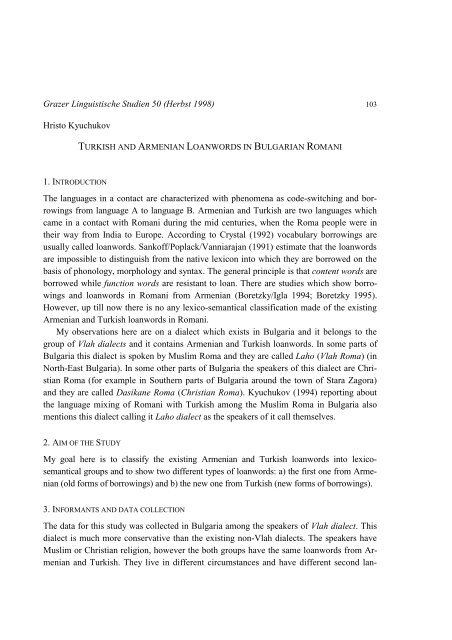
![Download PDF - [romani] Projekt](https://img.yumpu.com/54255972/1/184x260/download-pdf-romani-projekt.jpg?quality=85)
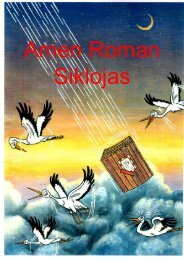
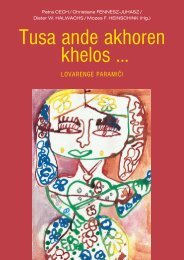
![Download PDF - [romani] Projekt](https://img.yumpu.com/54255951/1/184x260/download-pdf-romani-projekt.jpg?quality=85)
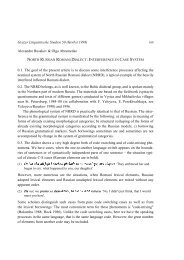
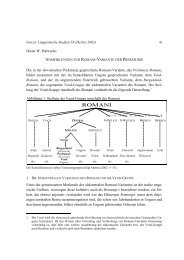
![Grazer Linguistische Studien 51 (Frühjahr 1999 ... - [romani] Projekt](https://img.yumpu.com/54255949/1/184x260/grazer-linguistische-studien-51-fra-1-4-hjahr-1999-romani-projekt.jpg?quality=85)
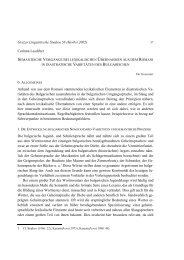
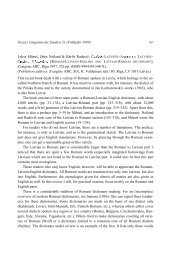
![Download Lehrbuchkommentar - [romani] Projekt](https://img.yumpu.com/16351903/1/184x260/download-lehrbuchkommentar-romani-projekt.jpg?quality=85)
![Download PDF - [romani] Projekt](https://img.yumpu.com/10027974/1/184x260/download-pdf-romani-projekt.jpg?quality=85)